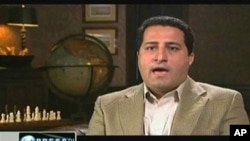Iran's state media say an Iranian nuclear scientist has taken refuge in Pakistan's embassy in Washington and is seeking an immediate return to his homeland.
The latest twist in scientist Shahram Amiri's case follows conflicting accounts, reportedly by the scientist himself, that he had been kidnapped and tortured by the U.S. Central Intelligence Agency or that he was in the United States for academic studies.
Iran says Amiri was captured and handed over to U.S. intelligence agents while he was visiting Saudi Arabia. Washington denies the charge.
U.S. State Department spokesman P.J. Crowley said Tuesday that Amiri has been in the United States "on his own free will" and was free to go. Crowley said Amiri traveled to the Iranian interests section of the Pakistani embassy on his own and was in the process of making travel arrangements to return to Iran.
Amiri had been working for Iran's Atomic Energy Organization, which the United States and other countries suspect is trying to develop nuclear weapons - a charge Tehran denies.
A series of video messages have only added confusion to the case. The latest, aired on Iranian television last month, showed a man identified as Amiri saying he had escaped from American intelligence forces, was in hiding and feared for his life.
The message followed two others, also purportedly by Amiri, earlier in the month.
In the first, a man says he had been kidnapped during a joint Saudi-American operation last year.
The next day, another video surfaced, with the speaker saying he was studying medical-related physics in the United States and had no role in nuclear weapons research.
An American news network reported that Amiri had made the second video because he had defected to the United States to help it in its case against Iran and its nuclear program. ABC television says the Iranian government threatened the scientist's relatives, if he failed to return.
Paul Ingram is the executive director of the British American Information Security Council in London. He says those following the case will draw their own conclusions based on their existing allegiances.
"Each story has within it its own sense of consistency," Ingram said. "However, it has to be said, if it is true that he has turned up at the Pakistani embassy within Washington and is now wanting to be repatriated to Iran, that on balance it would seem, the balance of probabilities and that is how far I would be able to go, the balance of probabilities seem to have shifted towards Iran's side of the story."
Because Iran and the United States have no diplomatic ties, Pakistan's embassy in Washington hosts an Iranian interests section. A Pakistani Foreign Ministry official said Iranian officials at the interest section in Washington informed him they are working to repatriate Amiri.
Ingram adds that if this turns out to be a case of extraordinary rendition - the U.S. policy of capturing wanted people overseas - it would seem to be the first suggestion that the policy covered such people as scientists.
Iran: Missing Scientist Takes Refuge in Pakistan Embassy in US













